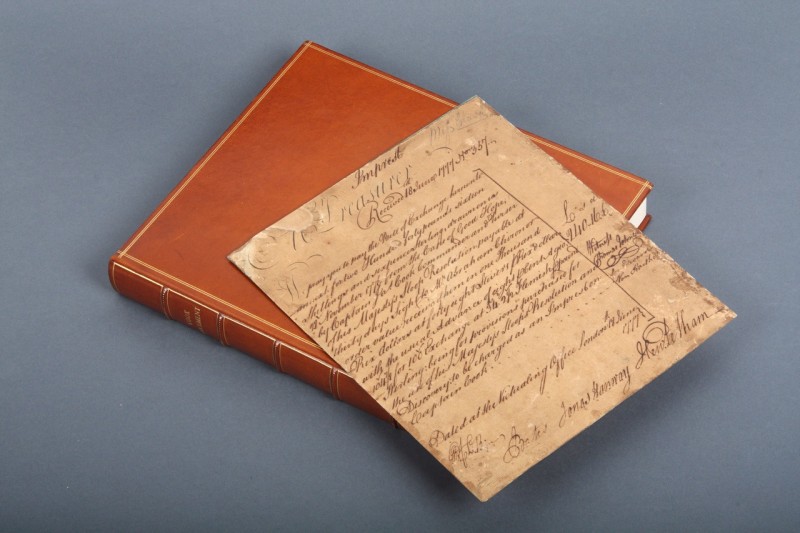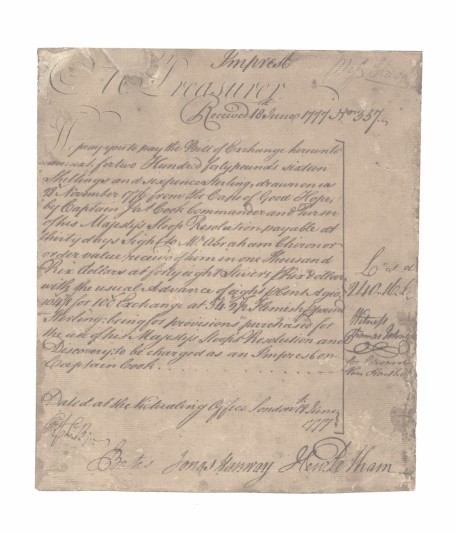Dr. Sophie Forgan, Chairman of Trustees, writes:
Any document relating to the Cook voyages is now extremely rare and the Museum is most grateful to the Friends of National Libraries for their help in enabling this acquisition. Imprest documents are unusual and only two others survive from those issued by Captain Cook on this voyage, neither of which are held in this country.
An added interest is the fact that this particular document re-emerged, in classic fashion, in a country house, Brancaster Hall, Norfolk. The document was discovered when the house contents were listed for sale in 2002, and it was framed with a letter from Captain Cook hidden within the backing. The documents appear to have been in the Simms Reeve family at Brancaster for well over 100 years. Both were later sold in 2006 at Sotheby’s. There may also even have been a connection to Whitby through the Corner family, as John Corner, merchant of Whitby, married into the Simms Reeve family and was the person who acquired the journal of Captain Cook which is now in the State Library of New South Wales.
An Imprest document is a receipt for a bill of exchange, issued in this case by Cook payable to Abraham Chiron at the Cape of Good Hope for supplies taken on board Resolution and dated 17 June 1777. Chiron was an important figure in Cape Town at that time, a German immigrant who established a significant business providing supplies for the numerous ships stopping on their way to the East. The document is signed off by officials of the Victualling Office in London, including Jonas Hanway, the founder of the Marine Society (1756) which took destitute boys and gave them rudimentary training for the Royal Navy and merchant marine.
The document has several interesting aspects to it. It allows us to tell the story of provisioning of Cook’s ships around the world and shows one aspect of increasing globalisation, something of which we are intensely conscious of today. Transnational systems of currency exchange were being refined and made more flexible in the late 18th century. Rix dollars, the currency used in this bill of exchange, may be compared to the US dollar, the pound sterling or the euro in helping to enable long distance trade and travel. The Treasury and Admiralty were familiar with using such currencies and had quite a sophisticated accounting system in operation for long voyages. The ‘imprest’ system refers to the sum set aside to cover expenses, which would then be topped up once depleted. Trusted captains such as Cook could therefore negotiate for supplies with the confidence that the debt incurred would be redeemed back home, and they did not therefore have to carry large amounts of money on voyages of long and uncertain duration.
It also shows how carefully Cook oversaw the provisioning and was always concerned to provide fresh food and water whenever he could, a key element in the battle against the dread disease of scurvy. While he was not aware of the scientific explanation of scurvy, Cook never lost a man to the disease and was always concerned to provide fresh food and water whenever he could. Supplies were meticulously checked and replaced if possible, just as fresh water was taken on board to replace stale casks. The third voyage was a long one heading for the North-West Coast of North America, and while Cook could expect to resupply in New Zealand and Tahiti, he made sure whenever possible that fresh supplies took the place of salt provisions which could then be reserved for a less easy passage of the voyage.
The document is an important addition to our archive and allows depth of interpretation showing how Cook operated within standard naval supply processes of the time.

